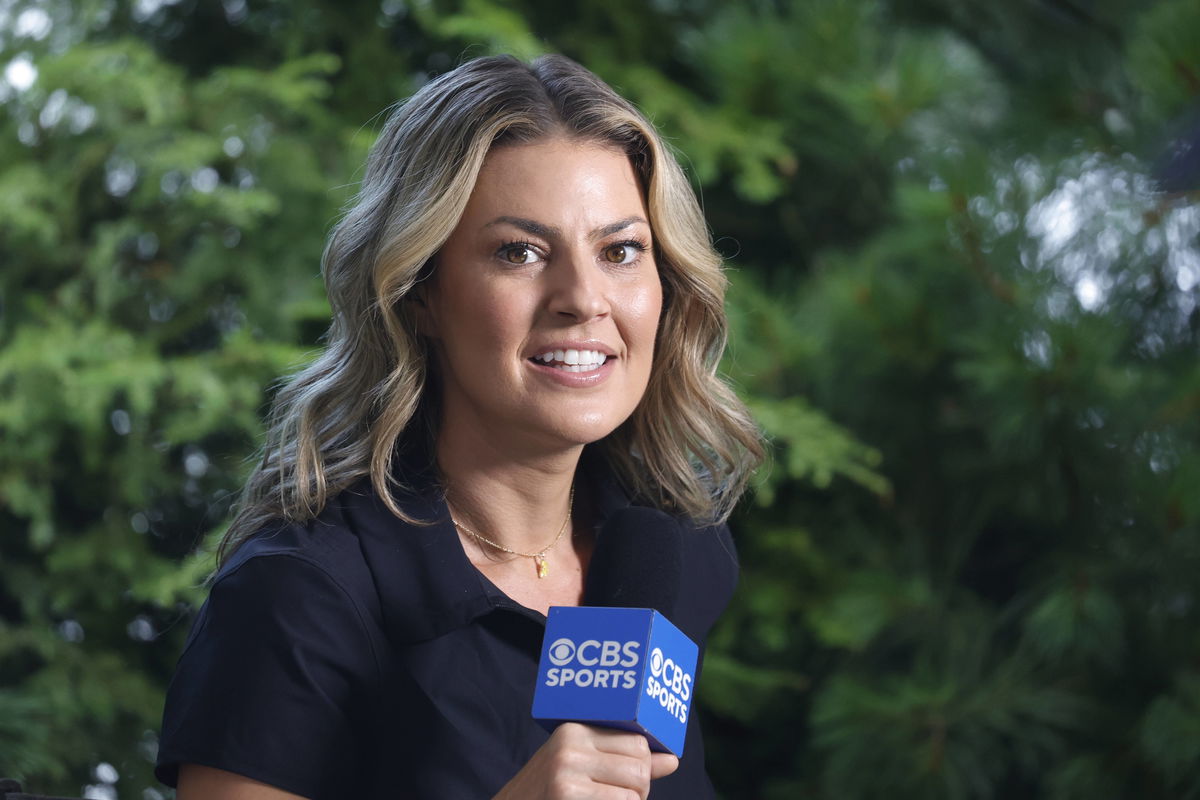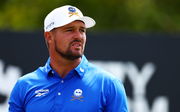
Imago
SILVIS, IL – JULY 06: CBS announcer Amanda Balionis interviews golfer Luke Clinton during the third round of the John Deere Classic on July 6,2024, at the TPC Deere Run in Silvis, Illinois. Photo by Brian Spurlock/Icon Sportswire GOLF: JUL 06 PGA, Golf Herren John Deere Classic EDITORIAL USE ONLY Icon24070645

Imago
SILVIS, IL – JULY 06: CBS announcer Amanda Balionis interviews golfer Luke Clinton during the third round of the John Deere Classic on July 6,2024, at the TPC Deere Run in Silvis, Illinois. Photo by Brian Spurlock/Icon Sportswire GOLF: JUL 06 PGA, Golf Herren John Deere Classic EDITORIAL USE ONLY Icon24070645
For the past month or so, Amanda Balionis has been on the go. Her life has seen a whirlwind—from PGA Tour reporting to analyzing NFL scores. All while she was battling nerve injuries. It doesn’t take an expert to see that her weeks have been tough. Yet through it all, Balionis often turns to Instagram, sharing updates and tips about how she manages the load. And for some, it’s become an invitation to open up about their own struggles. Especially Kira Dixon.
Watch What’s Trending Now!
“Amanda Balionis, friend of the pod, posted something on her Instagram story yesterday that resonated with me. I’m having anxiety dreams about things that I could be messing up at work, and I realized I have had the last week off. It’s been great. But I’m also having so much anxiety not working,” said Kira Dixon on the Fair Play Podcast.
The Instagram story that Dixon mentions was posted a few days back by Balionis, where she was answering a fan’s question of whether she has “recurring nightmares about work.”
ADVERTISEMENT
“A tradition unlike any other: every time I have a weekend off, I have a horrific work nightmare 😂. This one? I was covering an NFL game and completely forgot to prepare for one of the teams. Like, I knew 0 about them. Woke up in a full sweat. Happy Monday!” she replied.
This same persistent sense of unproductiveness poses a hurdle for Dixon to start on the work that has been piling up.
“I don’t know what to do with myself. I have this giant list of stuff that I’m supposed to get done, and like, the idea of starting the list gives me, like, the sweats, and I’m like, in this weird, I’m not good. I’m not well,” she added.
ADVERTISEMENT
Agreeing with her co-host, Mel Reid, on the same podcast, admitted that she, too, has dabbled with similar feelings.
“I can resonate with that completely. Especially when you’ve been going so hard for so long, and then all of a sudden you stop, you’re like, ‘Why can I not do this one task I meant to do today? Why is it such an effort for me to do?”
ADVERTISEMENT

ADVERTISEMENT
Seems like this is a common problem in the golf world. This probably could be why Balionis has constantly emphasized “listening to your body” through her health updates. Following 19 consecutive weeks on the golf circuit, the CBS reporter shifted to the regional NFL schedule. The move behind it was to have a lighter schedule so that she could focus on her neck and nerve pain that has been plaguing her.
She’s been in constant recovery mode since, which includes chiropractic therapy, acupuncture, and multiple rounds of steroid treatment. Yet, it was the deliberate slowing of her schedule and refusal to push through workouts that proved most significant.
“You can’t lie to your body,” she noted, “A forced physical, emotional, you know, mental break that was absolutely needed.”
ADVERTISEMENT
None of this is new for Balionis, who has been very candid about health in general. Since 2019, she has openly shared her experience with therapy, lifestyle changes, and much more following her father’s death in 2018. Earlier this year, she publicly supported the PGA Tour’s Mental Health Awareness Month.
All these conversations and initiatives are important in a sport that has recently seen an influx of back-to-back tournaments. Whether it’s the PGA Tour or the LPGA, critics as well as players have called out the condensed calendar, with at least 40+ events every year. And if reporters and broadcasters have been suffering so much due to exhaustion, one can only wonder what the players would be going through.
Top Stories
Tiger Woods’s GF Vanessa Trump and Daughter Kai Steal the Spotlight at His 50th Birthday Bash

Tiger Woods’ Lavish Gift for 300 Guests During 50th Birthday Bash Makes Jaws Drop: ‘Will be Worth a Lot One Day’

Bryson DeChambeau Has Bad News for LIV Golf & PGA Tour as He Considers Alternate Career Path

Tiger Woods’s GF Vanessa Trump Wasn’t On Board With Daughter Kai’s New Family Addition

Pat Perez’s PGA Tour Reinstatement Comes With an Unexpected Limitation

ADVERTISEMENT
Golfers advocate for taking a pause
In recent years, several notable players have come forward to talk about the impact severe exhaustion can have on their mental health. But with no change in sight, several of these players take some necessary steps. One such name is Lexi Thompson.
After grilling herself on the course for years, she recently decided to limit her participation on the LPGA Tour. Initially opting for a complete retirement, she changed her mind and has now undertaken a sort of “semi-retirement.” Now her calendar just involves playing 10 events a year, a much-needed respite from the earlier grind.
Then there is Nelly Korda, who very recently talked about prioritizing her physical health.
ADVERTISEMENT
“I would say since kind of the summer, it’s been go, go, go, go, go… If I have two weeks, I prioritize rest and recovery for my body,” she shared. “The more I play, the more my body gets beaten up, especially with how condensed our schedule has been from kind of the beginning of the summer to right now with all the travel.”
Yet before she could take the break, an old injury flared up, and she had to withdraw from the International Crown in Asia. This is a further sign of why immediate focus on health is a necessity. At the same time, the tours on both men’s and women’s circuits need to take note of making their calendar better.
ADVERTISEMENT
ADVERTISEMENT
ADVERTISEMENT

